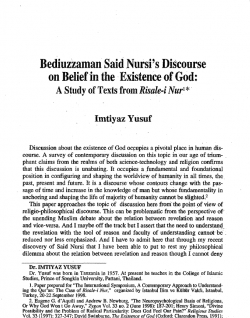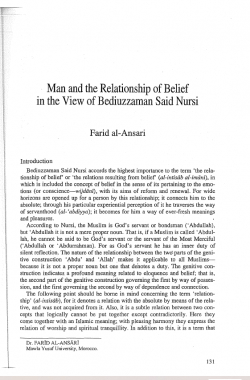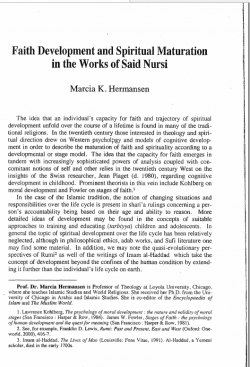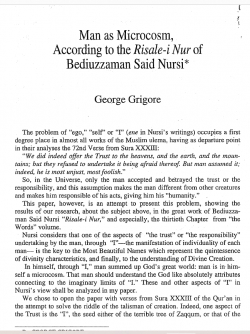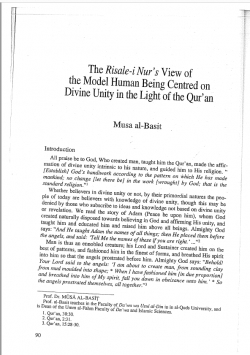Ph.D. Thesis - Doktora Tezi Said Nursi’s Ideal for Human Society: Moral and Social Reform in the Risale-i Nur
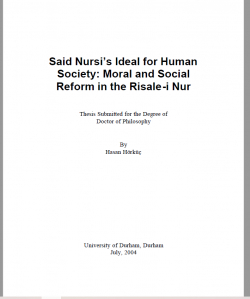
Book Stores
Type
E-Book
Authors
Category
Ph.D. Thesis - Doktora Tezi
[ Browse Items ]
Publication Year
2004
Publisher
Durham University, United Kingdom
Pages
482
Subject
Religion
Series Name
Abstract
This thesis presents a critical analysis of the writings and discourse of Said Nursi of
Turkey (1876-1960), an important figure in the 20th century Muslim World, with
special reference to “ideal society”. Among the many writings on Nursi’s life and
ideas, unfortunately none have specifically discussed his ideas regarding “ideal
society” in an academic context. This thesis is an attempt to trace an understanding of
the foundations and origins of the footsteps of Nursi’s thought system, in which he
deals with ideas linked to “ideal society”. Priority is given to his socio-theological
rather than theological aspects of his writings.
The main objective of the thesis can be roughly summarised as an exploration of the
impact of religion, science and social factors in the thoughts of Nursi on “ideal
society” by employing a combined theoretical framework consisting of modernist and
contemporary approaches.
The study is divided into two parts. The first part presents a general overview of the
concept of “ideal society” throughout history. The second chapter sets out the
background to his life and his ideas, examining the varied writings in each period and
aiming to find the parallels between the general course of the Islamic world in the 20th
century and the course of Nursi’s life. The second part takes up the main themes of
his discourse. Belief as the bedrock of society is outlined together with the dichotomy
between iman and Islam. Particular attention is given to his intellectual methodology
and main influences. Later social reform and social change is also considered. Itassesses whether Islam is something which can be imposed from top or bottom; with
particular reference to a-political Islam and the phenomenon of social change.
Furthermore, religion, science and scientism are addressed, applying the new
terminology of “Sacrelisation of Science”. By providing a composite picture of
Nursi’s ideas of “ideal society” in a detailed part, the thesis also deals with his views
on politics, the West and civilisation.
In addition, the study is supported by two appendices, containing a full bibliography
of his works and studies.
Turkey (1876-1960), an important figure in the 20th century Muslim World, with
special reference to “ideal society”. Among the many writings on Nursi’s life and
ideas, unfortunately none have specifically discussed his ideas regarding “ideal
society” in an academic context. This thesis is an attempt to trace an understanding of
the foundations and origins of the footsteps of Nursi’s thought system, in which he
deals with ideas linked to “ideal society”. Priority is given to his socio-theological
rather than theological aspects of his writings.
The main objective of the thesis can be roughly summarised as an exploration of the
impact of religion, science and social factors in the thoughts of Nursi on “ideal
society” by employing a combined theoretical framework consisting of modernist and
contemporary approaches.
The study is divided into two parts. The first part presents a general overview of the
concept of “ideal society” throughout history. The second chapter sets out the
background to his life and his ideas, examining the varied writings in each period and
aiming to find the parallels between the general course of the Islamic world in the 20th
century and the course of Nursi’s life. The second part takes up the main themes of
his discourse. Belief as the bedrock of society is outlined together with the dichotomy
between iman and Islam. Particular attention is given to his intellectual methodology
and main influences. Later social reform and social change is also considered. Itassesses whether Islam is something which can be imposed from top or bottom; with
particular reference to a-political Islam and the phenomenon of social change.
Furthermore, religion, science and scientism are addressed, applying the new
terminology of “Sacrelisation of Science”. By providing a composite picture of
Nursi’s ideas of “ideal society” in a detailed part, the thesis also deals with his views
on politics, the West and civilisation.
In addition, the study is supported by two appendices, containing a full bibliography
of his works and studies.
Number of Copies
1
| Library | Accession No | Call No | Copy No | Edition | Location | Availability |
|---|---|---|---|---|---|---|
| Main | 186 | 1 | Yes |
